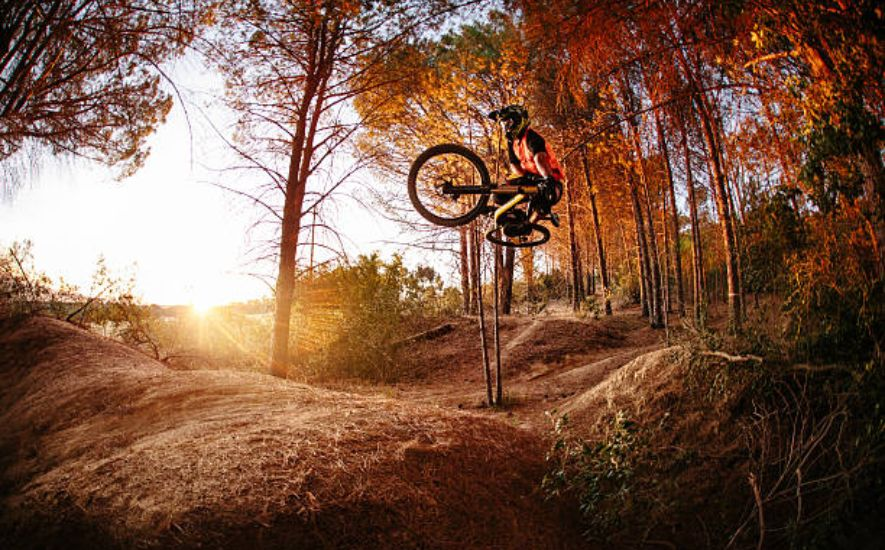Mountain bikes are a popular choice for many riders due to their versatility and rugged design. They are often thought of as the go-to option for off-road adventures and challenging terrain, but what about using them on the road?
The question of whether mountain bikes are good for road riding is a common one, and the answer depends on various factors. Some riders prefer to use a mountain bike for road riding because it offers a more comfortable and upright riding position. This can be especially beneficial for long-distance rides or for riders who experience discomfort on a road bike.
Mountain bikes are also often equipped with wider tires, which can provide better traction and stability on the road. However, there are also drawbacks to using a mountain bike for road riding. The heavier frame and wider tires can make it more difficult to achieve higher speeds and can also increase resistance, making it more challenging to pedal uphill.
Additionally, the suspension mountain bike wheels can absorb energy that could be used to power the bike, reducing overall efficiency. Ultimately, the decision of whether a mountain bike is a good choice for road riding depends on the individual rider's needs and preferences.

Advantages of Using Mountain Bikes on the Road
The advantages of using mountain bikes on the road include increased maneuverability and versatility, a more comfortable riding position, and improved off-road capabilities.

Mountain bikes have wider tires and a more upright riding position that allows for greater control on a variety of surfaces.
They are also durable and can handle rough terrain, making them suitable for light off-road excursions.
Additionally, mountain bikes often have a range of gears, making tackling hills and other challenging road conditions easier. Here are some detailed written advantages of using a mountain bike.
Versatility
One of the biggest advantages of using a mountain bike on the road is its versatility. Mountain bikes are designed to be used on a variety of terrains, including paved roads, gravel roads, and off-road trails.
This makes them ideal for commuters who may encounter a variety of road conditions during their journey.
Comfort
Mountain bikes are designed with a comfortable and upright riding position, making them more comfortable for longer rides than road bikes.
They also typically have rear suspension systems that absorb shock, reducing fatigue and discomfort during long rides.
Durability
Mountain bikes are designed to be tough and durable, making them ideal for use on the road. They are often made from materials such as aluminum or carbon fiber, which are resistant to wear and tear and can withstand the demands of regular use.
Traction
Mountain bikes have wider tires than road bikes, providing better traction on wet or slippery roads. This makes them ideal for use in inclement weather conditions, where road bikes may struggle to maintain traction.
Maneuverability
Mountain bikes are designed for off-road use, which means they are highly maneuverable. This can make them ideal for navigating through tight spaces, such as city streets, and avoiding road obstacles.
Carrying Capacity
Mountain bikes often have the capability to mount accessories such as pannier racks, baskets, or water bottles, which makes them ideal for commuting or carrying cargo. This can be especially useful for cyclists who need to transport their work or school supplies.

Disadvantages of Using Mountain Bikes on the Road
Mountain bikes are meant for off-road riding, but that doesn't mean they can't be used on the road. Mountain bikes can be ridden on the road if you have proper skills and know how to do it. However, there are some disadvantages to using mountain bikes on the road.

Mountain Bikes Are Hard to Handle
Mountain bikes are made for rough terrain, not smooth roads. Their tires are wider than average and have knobby treads, giving them more traction in loose sand and mud.
The frame is also designed to absorb shocks when riding over bumps and ruts in the trail. None of these features make mountain bikes easy to handle on smooth asphalt.
Mountain Bikes Are Heavy
Compared with other types of bicycles, mountain bikes tend to be heavier than other models because they have sturdy frames and strong components like derailleurs and full-suspension mountain bike systems.
These features make them ideal for off-road use but problematic when pedaling them up steep inclines or at high speeds down steep hills.
Tire tread
Mountain bikes have wide knobby tires for riding on rough terrains such as dirt roads and trails. These tires have little traction on smooth surfaces like asphalt, making it difficult to safely ride a mountain bike.
You may also have trouble handling sharp turns or sudden stops when riding on hard surfaces with knobby tires because they can lose traction easily.
Weight
Mountain bikes weigh more than other bicycle types, which means they're harder to pedal uphill or carry around when you're not riding them.
In addition, if you want to take your mountain bike off-road — something many people do — then it's important to be lightweight enough to maneuver it easily through rough terrain without getting stuck in mud or sand traps along the way."
Mountain Bikes Get Dirty Quickly
Another disadvantage of using mountain bikes on the road is that it makes them dirty quickly. When riding with other people who are using road bikes and racing gear, it can make them look bad because their equipment will get dirty so quickly compared to those who use street bikes or those who actually race their bikes off-road (which isn't allowed in races anyway).

Characteristics of Mountain Bikes for Road Riding
Mountain bikes are traditionally designed for off-road adventures. However, their sturdy construction, good shock absorption, and wide tires are also well-suited for road riding. In this note, we will discuss the main characteristics of mountain bikes for road riding.

Frame
A mountain bike frame is typically made from durable materials like aluminum or carbon fiber. This helps the bike withstand the rough terrain it is designed for. However, the frame should also be lightweight for road riding to increase speed and efficiency.
Suspension
Mountain bikes usually have suspension systems to absorb shock and improve traction on rough terrain. For road riding, a front suspension system is usually sufficient and provides a smooth ride.
Tires
Mountain bike tires are designed with large knobs to provide traction on slippery or uneven surfaces.
For road riding, however, it is best to use tires with a smooth tread pattern to reduce resistance and improve speed.
Gearing
Mountain bikes have multiple gears to help riders tackle steep inclines and rough terrain. For road riding, a road-specific drivetrain with fewer gears is typically used. This allows for a more efficient and smoother ride.
Brakes
Mountain bikes often have hydraulic disc brakes, which provide good stopping power in wet or muddy conditions.
For mountain bike riding, disc brakes or rim brakes are both suitable options, with disc brakes being the more popular choice.

Considerations When Choosing a Mountain Bike for the Road
A mountain bike is a versatile type of bicycle that is designed for off-road terrain. However, many people also use mountain bikes for road cycling.

When choosing a mountain bike for the road, there are several factors to consider, including frame material, suspension, brakes, and road bike tires.
Frame Material
The frame material is important when choosing a mountain bike for the road. Three main types of frame materials are used in mountain bike construction: aluminum, carbon fiber, and titanium.
Each has its own unique properties and benefits. Aluminum is lightweight, durable, and affordable, making it a popular choice for many road cyclists.
Carbon fiber is also lightweight but more expensive and offers better shock absorption than aluminum. Titanium is a strong and durable material but is also the most expensive option.
Suspension
Many mountain bikes are typically equipped with suspension systems to help absorb shock and improve the bike's overall ride quality. A full suspension system is not necessary for road cycling, as the smooth surface of the road reduces the need for shock absorption.
A hardtail mountain bikes suspension system, which only has suspension in the front, is a good option for road cycling, as it provides adequate shock absorption without adding unnecessary weight.
Brakes
The type of brakes used on a mountain bike is also important when choosing a bike for the road.
Disc brakes are the most common type of brake used on mountain bikes, and they offer good stopping power and control in wet or muddy conditions.
On the other hand, Rim brakes are lighter and less expensive than disc brakes, making them a good option for road cycling.
Tires
The type of tires used on a mountain bike can also impact its performance on the road. For road cycling, smooth, narrow tires are best, reducing rolling resistance and providing a faster ride.
On the other hand, mountain bike tires are typically wider and have more tread, making them better suited for off-road terrain.

Frequently Asked Questions
Road bikes are cheaper than mountain bikes and require less maintenance, so that's one reason why they're popular among beginners. There's also a lot of competition in the road bike market, which means that there are plenty of options for riders on a budget.
If you're considering buying a road bike or mountain bike, then you should know that each type of bike has its own advantages and disadvantages. Here are some questions and answers about these two types of bikes:
Can you use a mountain bike on the road?
Yes, you can use a mountain bike on the road. However, it's important to note that mountain bikes are designed for off-road terrain, such as rocky mountain bike trails and rough terrain, and are typically not optimized for road riding.
They typically have wider tires with more tread for grip and stability, as well as a more upright riding position for control.
While it's possible to use a mountain bike on the road, it can be a less efficient and less comfortable ride compared to a road bike. Road bikes have slimmer tires and a more aggressive riding position that is optimized for speed and efficiency on paved roads.
However, if you are using a mountain bike for commuting or casual road riding, it's important to ensure your bike is in good working condition and that you have the necessary safety gear, such as a helmet and lights.
Are mountain bikes good for everyday use?
Mountain bikes are great for everyday use, especially if you live in an area with rough terrain or poorly maintained roads. They are designed to handle tough conditions, with features such as durable frames, sturdy suspension systems, and powerful brakes that make them ideal for everyday commuting or leisure riding.
Mountain bikes are also highly versatile, allowing you to switch between various types of terrain with ease. Whether you're riding through city streets, over rough trails, or up steep hills, a mountain bike is up to the task.
Mountain bikes are also relatively low-maintenance compared to other types of bikes. They are built to withstand rough conditions and don't require as much tuning or upkeep as road or racing bikes. This makes them a great choice for those who want a bike that's ready to ride whenever and wherever they are.
Can a mountain bike be as fast as a road bike?
No, a mountain bike cannot be as fast as a road bike. Mountain bikes are designed for off-road terrain and have wider tires, a more upright riding position, and suspension systems, which add weight and reduce efficiency.
Road bikes, on the other hand, are designed for speed and have narrow tires, a more aggressive riding position, and lightweight frames, making them much faster than mountain bikes on smooth roads.
However, mountain bikes are better suited for challenging and uneven terrain and provide more stability and control.
Ultimately, the speed of a bike is determined by several factors, including the rider's ability, the bike's design, and road conditions.
What are the disadvantages of mountain bikes?
Mountain bikes have several disadvantages, including:
- Cost: Mountain bikes can be expensive, especially high-end models.
- Maintenance: Mountain biking can be rough on bikes, which can result in frequent repairs or replacements of parts.
- Weight: Mountain bikes are usually heavy and can be difficult to carry around or manoeuvre.
- Inaccessibility: Some mountain biking trails may require a significant amount of effort to reach, making the activity less accessible for some individuals.
- Risk of injury: Mountain biking is a physically demanding sport and can result in injuries, such as cuts, bruises, and broken bones.
- Weather dependence: Mountain biking is often dependent on weather conditions and may not be feasible during inclement weather.
Why MTB is better than road bike?
Mountain bikes (MTB) are designed for off-road terrain and offer more stability, control, and versatility compared to road bikes. MTBs have wider tires, suspension systems, and a more upright riding position, which provides a smoother ride on rough terrain, rocks, and roots.
MTBs have a more robust frame and components, making them more durable and capable of handling steep descents and jump. On the other hand, road bikes are designed for speed and efficiency on smooth roads and are unsuitable for off-road use.
What are mountain bikes good for?
Mountain bikes are versatile and rugged bicycles designed for off-road cycling on rough terrains such as rocks, roots, and steep inclines.
They are equipped with a sturdy frame, suspension systems, wider tires and a wide range of gears to handle the challenging conditions of mountain trails.
Mountain biking is a popular sport that provides a full-body workout, as well as a fun and thrilling experience. It also offers opportunities for exploring scenic and remote areas, improving balance and coordination, and building endurance.
Whether you're a beginner or an experienced rider, mountain biking can be a great way to enjoy the great outdoors, challenge yourself physically, and build a sense of community with other riders.

Conclusion
Mountain bikes can be good for road use, but they may not be the most ideal choice for everyone. Mountain bikes are designed for off-road use with features such as wide tires, sturdy frames, and suspension systems to handle rough terrain.
These features can make the ride less efficient and more difficult to handle on the road, especially for long distances. However, some people may still prefer to use mountain bikes for road riding due to their comfort and versatility.
Ultimately, the best bike for road use will depend on individual preferences, riding style, and the type of road conditions that will be encountered.











